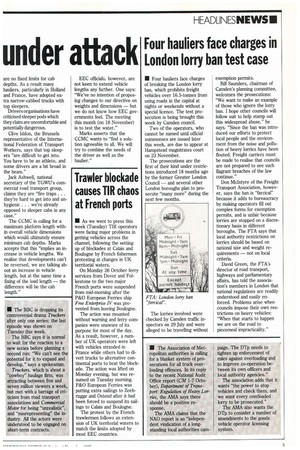Four hauliers face charges in London lorry ban test case
Page 7

If you've noticed an error in this article please click here to report it so we can fix it.
• Four hauliers face charges of breaking the London lorry ban, which prohibits freight vehicles over 16.5-tonnes from using roads in the capital at nights or weekends without a special licence. The test prosecution is being brought this week by Camden council.
Two of the operators, who cannot be named until official summonses are issued later this week, are due to appear at Hampstead magistrates court on 23 November.
The prosecutions are the first of their kind under restrictions introduced 18 months ago by the former Greater London Council — and several other London boroughs plan to prosecute "many more" during the next few months. exemption permits.
Bill Saunders, chairman of Camden's planning committee, welcomes the prosecutions: "We want to make an example of those who ignore the lorry ban. I hope other councils will follow suit to help stamp out this widespread abuse," he says. "Since the ban was introduced our efforts to protect local people and the environment from the noise and pollution of heavy lorries have been flouted. Freight carriers must be made to realise that councils are not prepared to see such flagrant breaches of the law continue."
Don McIntyre of the Freight Transport Association, however, says the ban is "farcical" because it adds to bureaucracy by making operators fill out complex forms for exemption permits, and is unfair because lorries are stopped on a discretionary basis in different boroughs. The FTA says that local authority restrictions on lorries should be based on national size and weight requirements — not on local criteria.
David Green, the FTA's director of road transport, highways and parliamentary affairs, has told the association's members in London that national regulations are readily understood and easily enforced. Problems arise when councils impose their own restrictions on heavy vehicles: "When that starts to happen we are on the road to piecemeal impracticality."




































































































